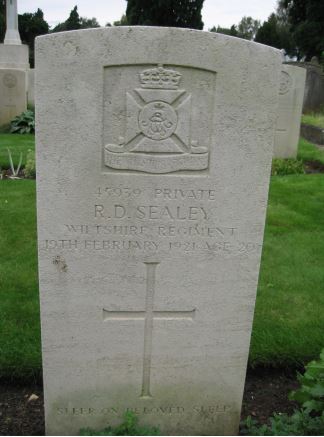3rd (Reserve) Battalion, Wiltshire Regiment

Ronald Douglas Sealey was born in Rodborough, near Stroud in early 1900. He was baptised on 15 April 1900. His parents were William Sealy, a printing compositor (1860-?) and his wife Kate (née Prowlin: 1870-1951). He was the only son of four children, the youngest of whom was born in 1911.
At the time of the 1901 Census the family lived at Rodborough but ten years later they resided at Brynmoor, Coronation Terrace, 24 Drove Road, Weston-super-Mare. All four children were living at that time. Later, it would appear that his mother, at least, moved back to Gloucestershire, to 48 Howard Street, Gloucester.
Little or no records have survived in respect of Ronald’s Army service. He was almost certainly conscripted in early 1918, after reaching his eighteenth birthday. He would then have undergone a period of training, the duration of which would have had to have been at least six months before he was sent abroad. There is no evidence to suggest that he was sent abroad and having been posted to the 3rd (Reserve) Battalion, Wiltshire Regiment he probably spent his military career in the Sittingbourne area of Kent, where the battalion formed the Thames and Medway Garrison.
A recently released Pension Record Card (PRC) notes that he was discharged from the Army of 17 October 1919. It is not clear if he was awarded any pension but it does appear that a small pension was paid to his mother, following his death. The PRC does state that his death was due to pulmonary tuberculosis, however, this was not considered attributable or aggravated by military service. Whether or not this was actually the case will never be known.
Ronald Douglas Sealey died on 19 February 1921, aged 20, at 48 Howard Street, Gloucester, this being confirmed by a notice of death placed in the Gloucester Journal of 26 February. He was buried in Gloucester Old Cemetery, where a standard CWGC headstone marks his grave. Notwithstanding his discharge from the Army in October 1919, he was probably considered to be in the Reserve, should hostilities re-commence prior to the final ratification of the Peace treaty, following the Versailles Conference.
Researched by Graham Adams 12 January 2020
